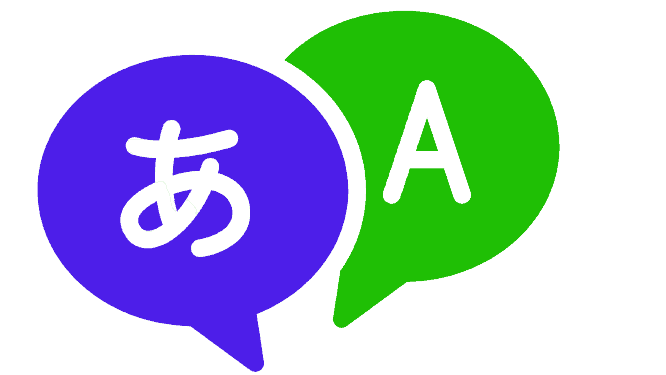Mondly vs Babbel: Are you prepared to go off on a linguistic journey? It might be challenging to🌍choose the ideal language-learning applications, but do not worry! Babbel and Mondly step into the ring, each with its own unique flair. 🥊 In this article, we’ll compare their features, teaching styles, and user experiences. Which one, then, will help you become fluent? Let’s solve the puzzle and locate your perfect language partner!
Mondly vs Babbel Comparison
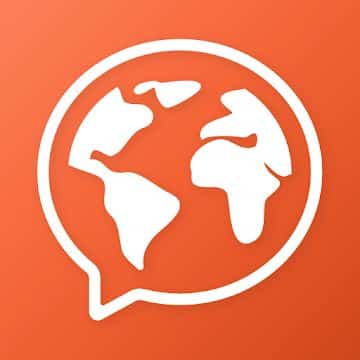
- Number of Languages: 41
- Free Trial (or free version): Yes
- Speech Recognition: Yes
- Avg. Lesson Length: 20 Minutes
- Pricing: $9.99
- Money Back Guarantee: 30 Days
- Grammar Instruction: Good
- Live classes: No
- Progress Tracking: Yes
- Tests/Quizzes: Yes
Mondly Overview
Mondly is a dynamic language learning software that improves language learning via the use of cutting-edge AI technologies. It offers a broad selection of languages and blends gamified learning with practical application. Users are drawn into practical language usage by its immersive experiences, which include virtual reality and augmented reality situations.
The voice recognition technology in the app provides interactive discussions and pronunciation practice. Daily courses, tests, and a vocabulary builder on Mondly encourage constant learning.
The app’s user-friendly UI and AI-driven personalisation adapt to different learning styles and rates of advancement. With a mix of free and paid material, it is good for language learners of all levels and goals, making the process fun and engaging.
My Mondly Experience
Mondly’s user interface looked pretty attractive, however after signing in, it seemed a little disorganized and took some effort to navigate. However, I thought it was perfect for newcomers like myself. I made learning Spanish my primary goal.
The daily courses, which included language, discussions, and chatbot interactions, were provided as cards. I got a new lesson every day, with a gamified presentation of numerous matching-type problems and sentence-formation drills.
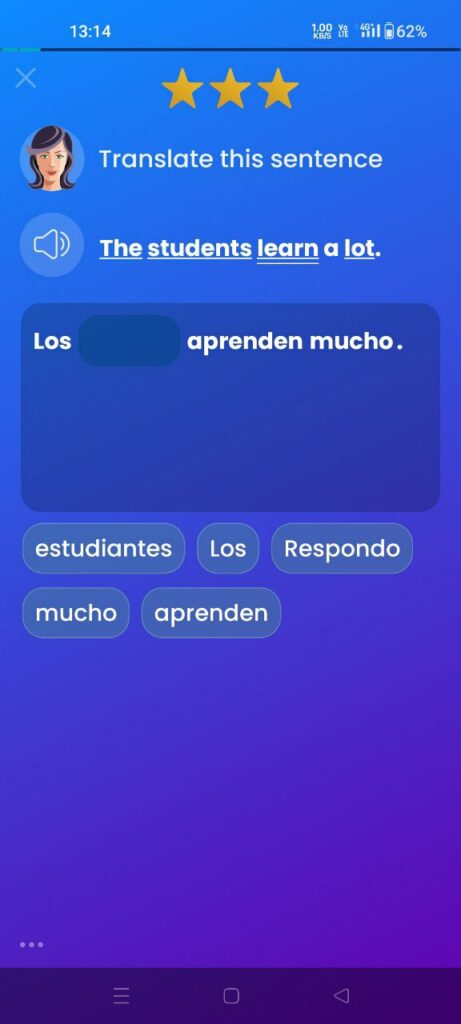
I found it particularly noteworthy because Mondly concentrated on imparting useful language abilities for everyday situations. The program included courses that attempted to increase my comfort level in interpersonal communication, whether it be in the context of family interactions, traveling to new locations, utilizing public transit, or even speaking with a doctor.
Each card offered eight lessons to explore when clicked, and a menu of lessons would appear after doing so. The leaderboard indicated my relative standing among other learners, while the statistics section showed my points and the amount of time I had spent studying.
I dove into the first lesson of the public transit curriculum. I had to match certain terms with appropriate photos, such as “ticket,” “train,” and “taxi,” which Mondly had presented to me. The Spanish pronunciation was also audible, which helped me better appreciate the sound of the language.
The app continually adds new modules to enable a consistent availability of brand-new material. The nicest thing was that they provided a good deal of information for free, which improved my experience while learning a new language.
Another notable change was the updated progress tracking system. It provided me with a clear picture of my development over time by displaying the days I had practiced and the overall amount of time I had devoted to studying.
This language application offered other AR/VR experiences applications in addition to the main app, enabling me to explore these immersive learning possibilities. Overall, Mondly’s gamified approach, useful lessons, and plenty of free material enhanced my experience with it.
Drawbacks
I did discover a few issues with the Mondly app and website that drew my notice. The user interface could be made more user-friendly and intuitive since it seemed like it lacked a little in those areas. Even though it periodically experienced slowness, Mondly’s online application managed to run well.
One thing I saw was that some of the lesson’s questions felt a little too simple, almost like a cakewalk. As a result, my language learning experience was less engaging and challenging than I had hoped.
It’s also important to note that Mondly doesn’t appear to lay much emphasis on teaching grammar. Even if the program is good at teaching useful vocabulary and conversational skills, it could fall short when it comes to digging into the nuances of grammar.
Despite these issues, I believed that Mondly’s approach and material as a whole were advantageous to my language learning experience. Despite some areas that could be improved, the highlights of the classes’ usefulness and gamification remained, making my overall journey entertaining and successful.
- Extensive Language Selection: Mondly offers an impressive range of 41 languages, making it an excellent choice for polyglots and learners interested in exploring diverse linguistic landscapes.
- Immersive Learning: The use of augmented reality (AR) and virtual reality (VR) in lessons adds an engaging and interactive element, enhancing the overall language learning experience.
- Speech Recognition Technology: Mondly’s speech recognition feature provides immediate feedback on pronunciation, aiding learners in refining their speaking skills and boosting confidence.
- Daily Lessons and Challenges: The app’s daily challenges encourage consistent learning habits, making it easier to integrate language practice into your daily routine.
- Interactive Conversations: Mondly’s simulated conversations allow learners to engage in realistic dialogues, helping improve conversational fluency and understanding.
- Varied Learning Exercises: The app offers a mix of exercises, including vocabulary, grammar, and comprehension, keeping the learning process diverse and engaging.
- Gamified Elements: Mondly’s gamification features, such as streaks and rewards, create a fun and motivating environment for learners to stay engaged and track their progress.
- Longer Lesson Length: Some users might find Mondly’s average lesson length of 20 minutes a bit longer, which could be challenging for those with limited study time.
- Focus on Basic Conversations: While suitable for beginners and intermediate learners, Mondly might not provide enough advanced content for those aiming for in-depth language fluency.
- Potential Learning Curve: The use of VR and AR might require some initial adjustment for users who are less familiar with these technologies, potentially affecting the learning experience.
Babbel Overview
Babbel is a well-known platform for learning languages that aims to assist users in developing practical language competency. With more than ten years of expertise, the platform places a strong emphasis on real-world interactions and usefulness. Experts in linguistics developed its curriculum, assuring its applicability and success.
With a large selection of languages available, Babbel can meet all of your language learning requirements. The platform’s interactive exercises, quizzes, and dialogues provide hands-on practice in reading, writing, listening, and speaking. It is appropriate for beginning and intermediate learners because to its user-friendly design and well-organized courses.
The app’s progress-tracking feature and personalized review sessions ensure continuous improvement. Babbel offers full access to its material via a subscription-based approach, making it a well-liked option among language lovers seeking a useful and engaging learning experience.
My Babbel Experience
The experience of exploring the Babbel website and app was enjoyable straight away. I was instantly drawn to the user interface’s relaxing nature, which was particularly noticeable on the online version. I started my language-learning experience by selecting Indonesian as my language of choice as it’s easy for English speakers.
My first class showed me how to properly greet people in Indonesian. I liked Babbel because of its distinctive teaching approach, which promoted memorizing of words like “good evening” and “good morning.”
I was able to hear native speakers pronounce these words throughout the lectures, which helped me identify and internalize the right pronunciation. My knowledge was significantly enhanced by the following challenge of putting the alphabets together to create useful Indonesian sentences.
The “Listen and repeat” questions in the app were also useful. The speech recognition was surprisingly sensitive, catching up and recognizing my spoken comments with accuracy, in my opinion.
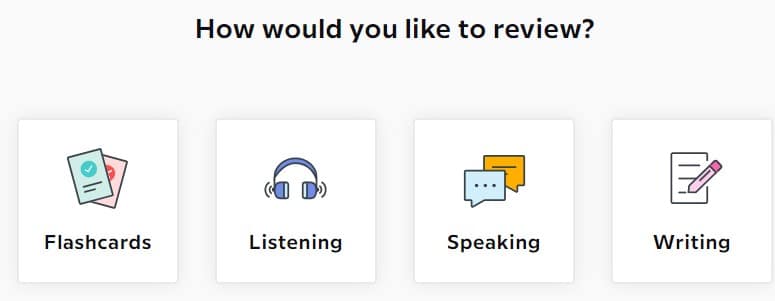
Through a variety of possibilities, reviewing my learning was made flexible and interesting. I could customize the procedure to fit my personal learning method by selecting to review via speaking, listening, writing, or flashcards.
Although the initial session was offered without charge, subsequent classes in Indonesian needed a premium plan membership. Despite this restriction, the option to create learning objectives was stimulating. I was able to list objectives for travel, hobbies, skill development, employment, my family, and/or education using Babbel. The site then offered an organized study schedule customized for my selected objective.
Babbel Live courses were present, which improved the learning process by providing in-person contact and direction. The application also included other features like Babbel Magazine and Games to further enhance the learning process.
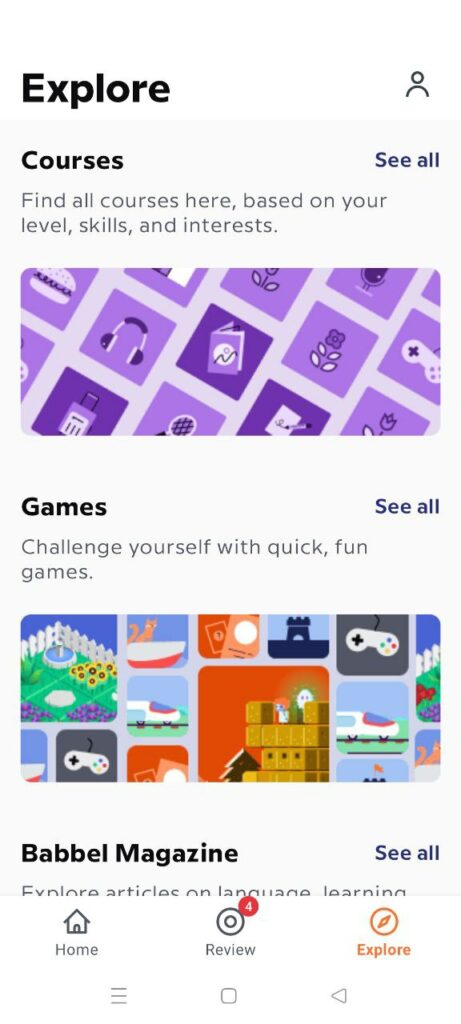
Overall, the platform’s engaging teaching style, user-friendly layout, and diversity of features that complemented the learning process made a positive impression on me. The platform was a great help to me in my efforts to learn a new language because of its emphasis on practical skills and variety of helpful resources.
Drawbacks
My use of the Babbel app and website also brought to light a few issues that need to be addressed. The lack of readily accessible free resources was one glaring drawback. Babbel, in contrast to other language platforms like Mondly, provides only one lesson for free, which is insignificant.
When comparing the value offer to other language learning choices, the price structure, in particular the lifetime package at $299, seems to be expensive. Potential customers seeking for less expensive options may be turned off by this high price.
Compared to sites like Mondly, I discovered that Babbel put less focus on gamification components in terms of engagement. The courses were useful, but the absence of immersion gamification may frustrate people who like interactive and entertaining learning.
Another drawback I encountered was the potential for monotony due to repetitive questions. Some users, like myself, could find it a little annoying when specific question types are repeated often, which might cause some boredom while studying.
- Structured Learning: Babbel offers a well-organized curriculum that guides learners through a systematic progression of lessons, ensuring a solid foundation in the language.
- Real-world Context: Lessons are designed around practical scenarios, helping learners apply language skills to real-life situations, which fosters meaningful learning.
- Variety of Languages: While not the most extensive, Babbel covers a diverse selection of 14 languages, catering to learners with various language interests.
- Focused Pronunciation Practice: Babbel emphasizes correct pronunciation through interactive exercises and repetition, aiding learners in sounding more natural.
- User-friendly Interface: Babbel’s simple and intuitive interface makes navigation and lesson completion smooth, both on the website and the app.
- Personalized Review Sessions: The app employs adaptive algorithms to schedule review sessions, reinforcing previously learned material and improving long-term retention.
- Specialized Courses: Babbel offers courses tailored for specific needs, such as business, travel, and culture, catering to learners with targeted language goals.
- Limited Language Selection: Compared to some other platforms, Babbel’s selection of languages might be considered limited, especially for those interested in more niche languages.
- Less Gamification: Babbel’s gamification elements are not as prominent as in other apps, which might be less engaging for users who enjoy a game-like approach to learning.
- Lacks Advanced Content: While suitable for beginner and intermediate learners, Babbel might not offer enough advanced content for those aiming for fluency beyond basic conversations.
Babbel & Mondly Detailed Comparison
User Interface and Experience
Both Babbel and Mondly provide a sleek and simple-to-use user interface and experience. The user interface seems tidy and well-organized, leading me rationally through classes.
The interactive exercises are easy to understand, particularly on the smartphone, and the step-by-step development helps me create a strong foundation. Tracking my progress and continuing where I left off was easy because to the layout’s clear visual clues.
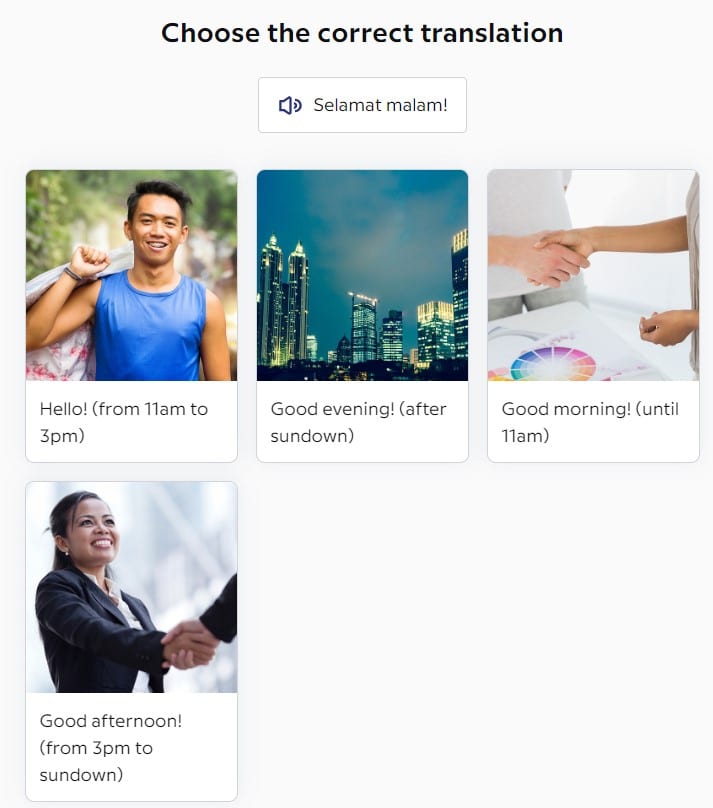
However, I found Mondly’s UI to be a little more vibrant and aesthetically pleasing. Bright colors and gamified components, such as daily challenges, were used to boost interest. It’s unique capability of merging VR and AR situations drew my interest since it made learning genuinely immersive. The voice recognition system provided quick feedback on pronunciation and was pretty accurate. I felt like I had a genuine dialogue as a result of this.
Both applications provide a consistent user experience across online and app platforms, and they both adjust to different devices. The user-friendly design and cutting-edge features of Mondly’s app made my language learning experience entertaining and participatory in addition to being informative.
Language Course Selection
Both Babbel and Mondly provide an excellent range of language education alternatives. How many languages does Babbel have? It has decent coverage for 14 languages, yet its selection is well-balanced and includes popular languages.
It is a fantastic option for someone wishing to go deeply into a small number of languages because of its narrow emphasis. The average lesson length of around 12 minutes is manageable, especially for someone with a busy schedule.
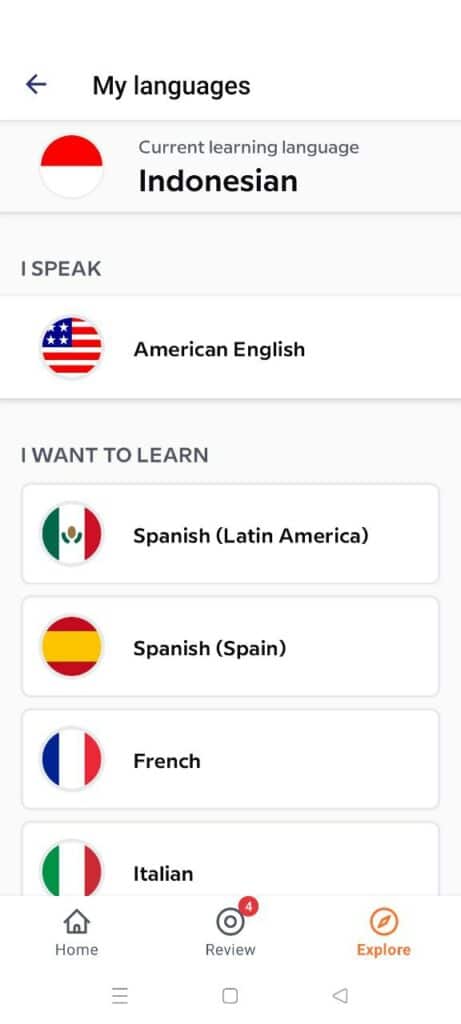
On the other hand, Mondly offers an impressive 41 languages, which is quite extensive and caters to a broader range of learners. It’s wonderful if you want to learn many different languages or if you have a particular obscure language in mind. The typical class lasts 20 minutes, which is a little bit longer (comparable to Rosetta Stone’s 18 minute classes). For individuals who are pressed for time, this may not be a problem, but the lengthier classes often go deeper and cover additional topics.
Both platforms are designed to support different learning styles and tempos. While Babbel’s targeted approach works well for those who are serious about learning certain languages, It’s vast assortment could be appealing to more experimental learners.
Babbel’s strategy of providing less languages allows for a more extensive and in-depth curriculum in terms of choosing language courses. I found their lessons to be well-structured, focusing on practical usage, vocabulary, grammar, and cultural insights. This level might be very helpful if you want to develop conversational fluency and a solid command of a particular language.
With its wide variety of languages, Mondly gives users a wider exposure to many linguistic and cultural environments. Although the duration of a class is significantly longer on average, I found that having more time often allowed for additional examples, elaboration, and interactive components. This might be helpful if you want a more all-encompassing method of language study that includes knowledge of many dialects and subtlety.
The flexibility of the session durations offered by both systems enables users to fit language practice into their schedules. Mondly’s somewhat lengthier lessons can be intriguing for a deeper dig, while Babbel’s slightly shorter courses would suit individuals who like rapid, concentrated sessions.
Learning Methods and Techniques
The emphasis of Babbel’s teaching strategies is on practical language use and real-world dialogues. The way that the lessons are organized helps students learn language skills that they can apply right away in a variety of contexts.
Building a strong foundation is facilitated by the emphasis on vocabulary, grammar, and interactive tasks. Their method was especially useful for enhancing speaking, writing, and reading abilities. The systematic development of simple to difficult subjects guarantees a steady and thorough learning experience.
Mondly uses cutting-edge strategies like gamification and AI-powered courses. Language learning is given a special dimension by the use of augmented reality (AR) and virtual reality (VR), which makes it interesting and immersive.
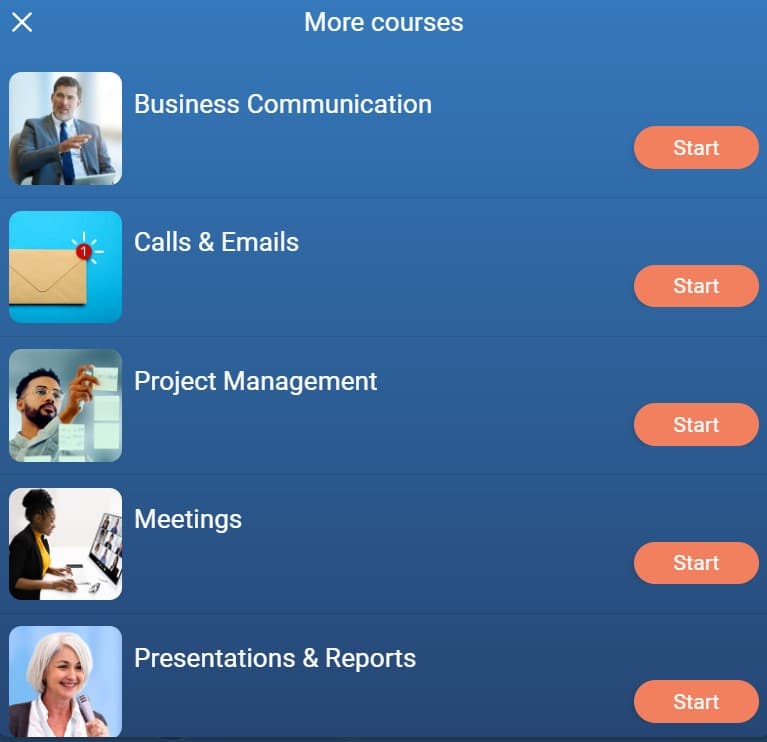
The voice recognition technology in the app facilitates interactive dialogues, which helps with pronunciation practice and increases speaking confidence. The dynamic nature of Mondly’s method is enhanced by the inclusion of daily challenges and lessons. For individuals who want a more engaging and diverse educational experience, this approach is especially intriguing. If you are more interested in voice pronunciations, you can also try Memrise as an alternative.
Although both platforms provide useful methods, Babbel’s organized approach could be more appealing to people who want a step-by-step process with an emphasis on practical application. In contrast, learners wanting an engaging and immersive experience might find Mondly’s creative use of technology and gamification appealing.
Gamification and Engagement
Babbel’s lectures lightly employ gamification while putting more of an emphasis on organized information and useful tasks. While not as pronounced as other platforms, the incorporation of quizzes, interactive dialogues, and review sessions keeps the learning process engaging. The progression system, unlocking new lessons as you complete the previous ones, adds a sense of achievement and motivation.
With its daily challenges, learning streaks, and awards that promote constant learning, Mondly adopts a more pronounced gamified approach. The procedure is made more engaging and dynamic by the addition of AR and VR experiences. Users who like game-like incentives may find these components to be especially enticing since they foster a feeling of success and growth.
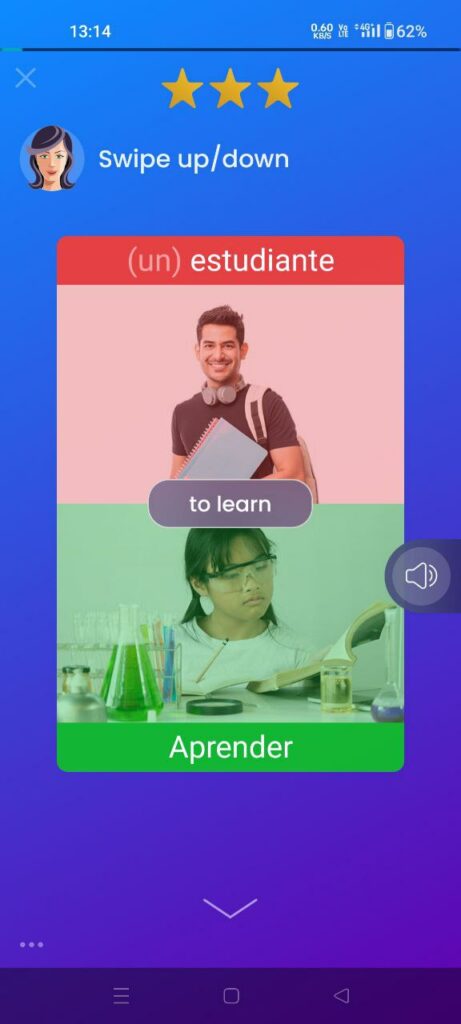
Babbel or Mondly which is good in terms of gamification elements? Both systems excel at gamification and engagement in different ways. Babbel’s more subdued approach can be suitable for students who value scheduled lessons and a less game-focused learning environment.
On the other side, for people who want a lively and immersive learning experience, Mondly’s interactive features and dynamic rewards system may be more appealing.
Pronunciation Practice
Babbel’s classes include targeted pronunciation practice. You can hear native speakers on the site in audio chunks, which will help you comprehend and imitate their appropriate pronunciation.
While it’s effective, the depth of this practice might not be as extensive compared to some other platforms. Babbel urges students to mimic native speakers to hone their ear for the proper pronunciation.
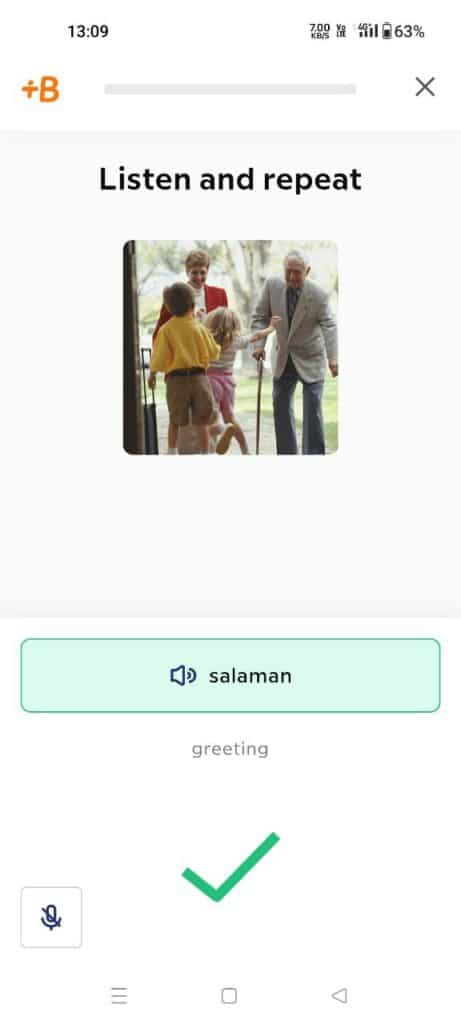
On the other hand, Mondly uses voice recognition technology to provide you quick feedback on how you pronounce words. You can practice speaking with this interactive tool and get immediate feedback on your accuracy.
This could enhance your pronunciation abilities and give you more self-assurance while speaking. In addition, the gamified approach of Mondly incorporates speaking challenges and conversational simulations, thereby increasing opportunities to practice speaking out loud.
It’s voice recognition technology can be especially intriguing if you place a high priority on intensive pronunciation practice with immediate feedback.
However, if you want a more integrated approach within the framework of classes, Babbel’s native speaker audio segments can be a good fit. Your decision will depend on how important practicing correct pronunciation is to your language learning process.
Progress Tracking and Analytics
Babbel provides a simple and transparent approach for monitoring progress. It retains a record of classes finished, subjects studied, and even language learnt. The platform gives visible indications of your progress, making it simple for you to recognize how far you’ve come. It provides a fair feeling of your overall progress and completion status while not being excessively detailed. You can always reset your progress on Babbel if you wanna start again from scratch.
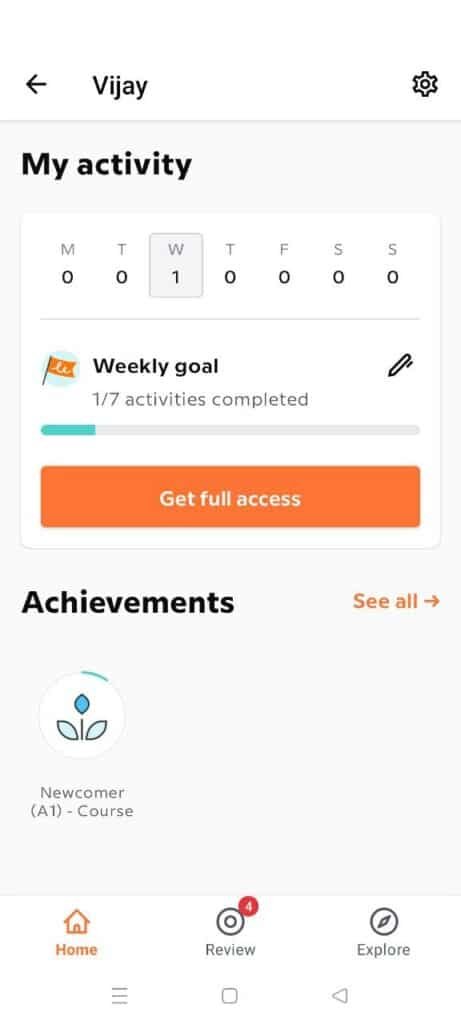
Progress monitoring is also available on Mondly, however it’s done in a more engaging way. The app shows you your daily learning streaks and data to gauge your consistency.
Why is Mondly better than Babbel in terms of progress tracking & analytics? It provides information on your activity, quiz accuracy, and the quantity of words you’ve learnt. This more detailed breakdown can be motivating for users who enjoy monitoring their learning journey closely.
Although both applications provide useful progress monitoring, Mondly’s approach comes across as more dynamic and interesting because to its streaks and extensive data.
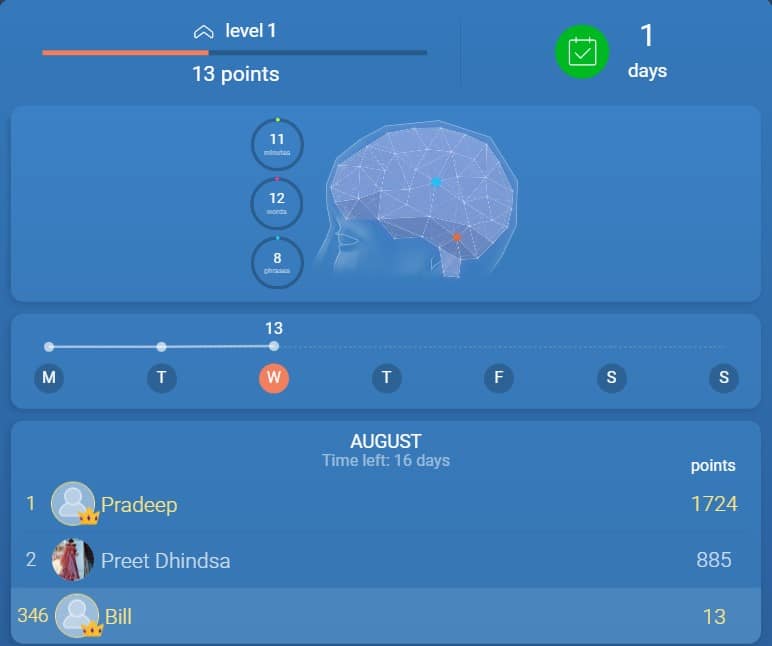
It’s analytics might be interesting to you if you appreciate keeping a regular learning streak and thrive on viewing detailed statistics. On the other hand, Babbel’s tracking method could be more to your taste if you like a clearer, simpler picture of your progress.
Mobile App Features
The UI of the Babbel mobile app is clear and user-friendly. Its main objective is to provide organized courses that address all facets of language acquisition.
The app is appropriate for learning while on the move since it offers interactive activities, tests, and vocabulary practice. Babbel’s lessons can be finished in less time, which is helpful for people who are busy. The app’s review sessions and progress monitoring aid in reinforcing learning over time.
With its gamified components, Mondly’s mobile app demonstrates a more dynamic approach. Daily tasks, AR/VR experiences, and voice recognition for practice in interactive conversation are all included.
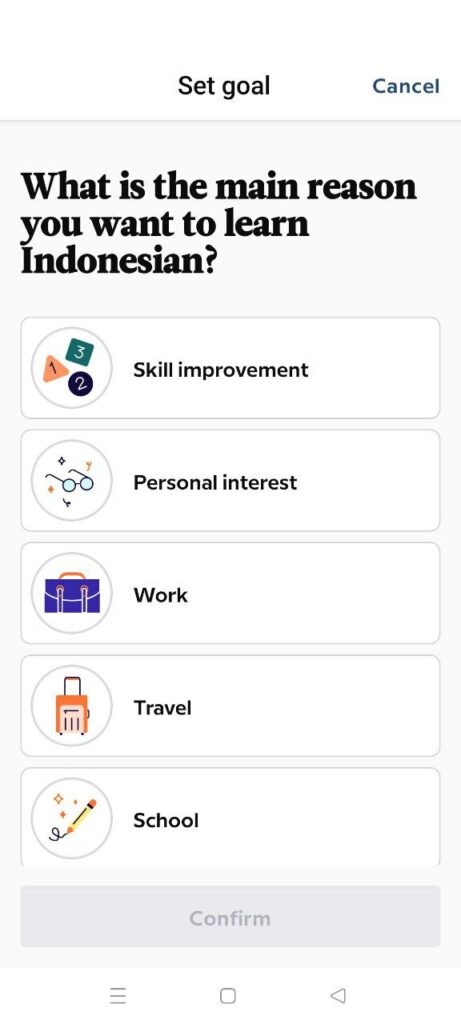
The extensive language selection of the program enables exploratory learning across many linguistic environments. With its immersive features, users can participate in realistic simulations, adding a special touch. The app’s emphasis on lengthier courses can be suitable for those who like sessions that are more in-depth.
Both applications provide mobile flexibility, but Mondly promotes gamification and interactive aspects with lengthier courses, whilst Babbel leans toward organized learning with shorter sessions. Babbel’s app might be a fantastic match if you like a more conventional learning style with brief sessions.
On the other side, Mondly’s app could be more in line with your tastes if you want gamified experiences and interesting interactions. Your decision will rely on how you like to use a mobile device for language study.
Also See: Deleting a Babbel account permanently.
Vocabulary Building Tools
Babbel offers a systematic approach to vocabulary building. In order to assist learners comprehend how new words and phrases are utilized in everyday circumstances, it contextually introduces new words and phrases.
The program includes review sessions and flashcards to help users retain terminology. It is appropriate for students who value a systematic approach because of the planned courses’ emphasis on progressively extending your vocabulary via thematic modules.
Through its engaging teachings, Mondly also places a strong emphasis on vocabulary development. The app uses games-based activities to improve word recall and use.
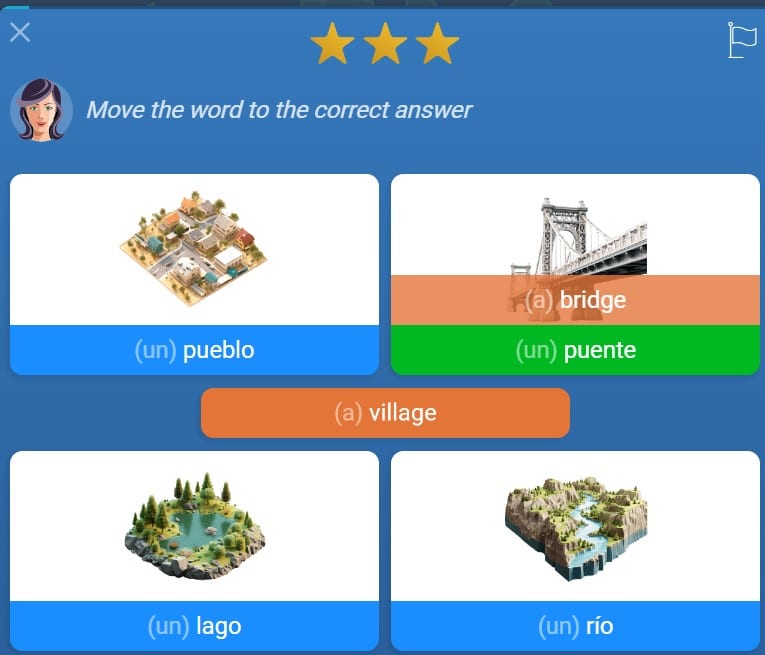
New vocabulary is routinely introduced in Mondly’s daily lessons and challenges, and the review system helps you remember what you’ve learned. The voice recognition tool also promotes speaking and listening, resulting in a comprehensive comprehension of terminology.
The two platforms provide useful vocabulary-building tools, but they do it in different ways. Babbel’s context-based method may appeal to those who want to learn words in context. Meanwhile, those who prefer routine, diverse exposure to new terminology may find Mondly’s gamified components and daily courses appealing.
Offline Learning Options
Babbel provides access to classes and learning resources offline. For students who wish to study without a live internet connection, this is very helpful. When connection is a concern, such as while travel or commuting, it is handy to download courses and practice offline.
Additionally, Mondly has an offline option that enables users to download courses and study without an internet connection. You can train even while you are not online, thanks to this functionality, which also applies to the gamified components.
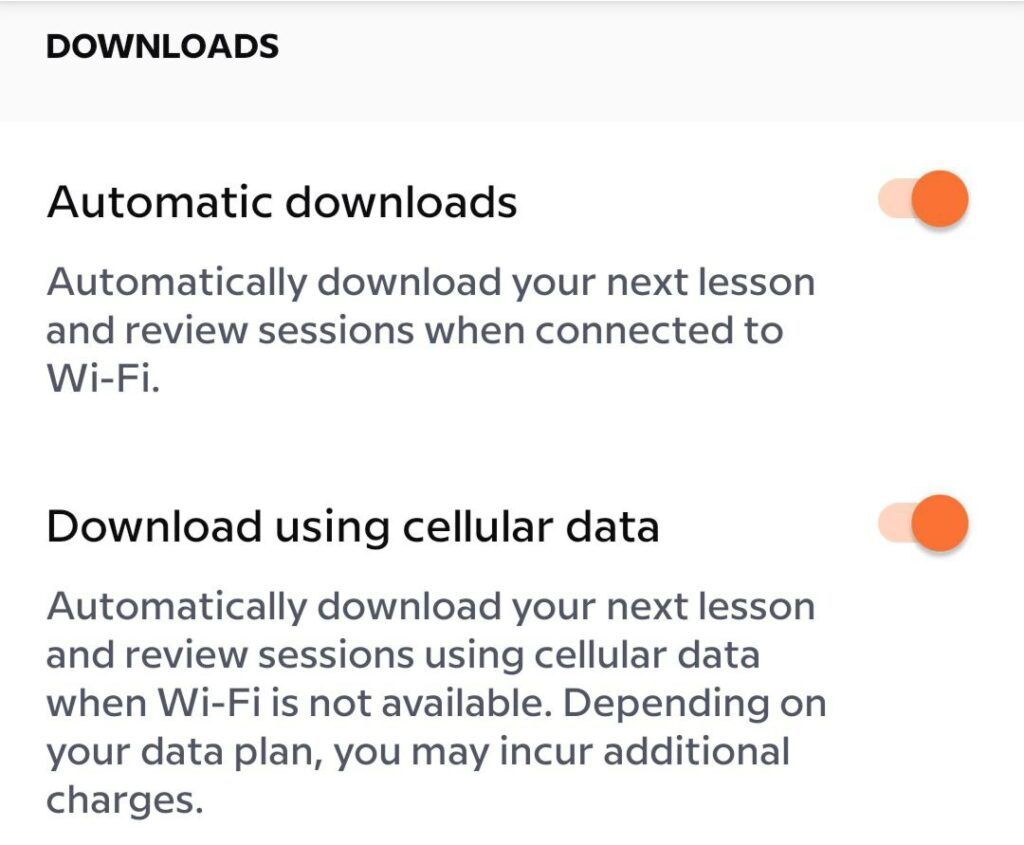
Does Mondly work offline? Yes. On this app, offline learning offers a well-rounded learning experience with interactive challenges and voice recognition exercises. You can download entire courses, unlike Duolingo which allows downloading just a few lessons.
By allowing users to access lectures and activities without requiring an internet connection, the two platforms place a high priority on offline learning. Both Babbel and Mondly are good choices if you value being able to continue studying even when you’re not connected to the internet.
Personalized Learning and Adaptive Algorithms
Babbel uses customized learning by adapting the courses to your learning objectives, level of development, and language proficiency. As you go through the platform, the complexity of the activities and courses is adjusted using adaptive algorithms.
While not as gamified, Babbel’s individualized approach delivers information and challenges tailored to your competency level, fostering consistent improvement.
Additionally, Mondly uses adaptive algorithms to personalize the learning process. The AI-driven methodology of the program adjusts to your abilities and preferences, leading you through classes at a speed that works for you.
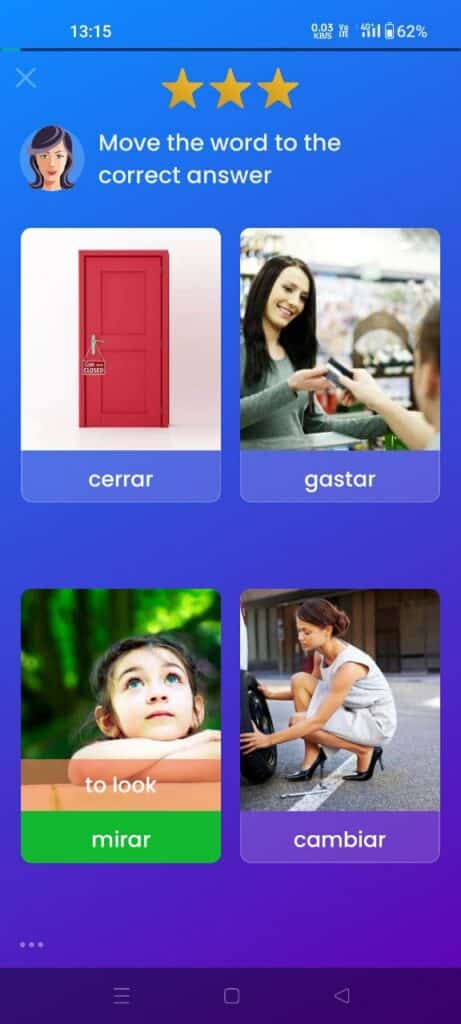
Through the changing challenges and immersive experiences it presents, Mondly’s gamified nature and interactive components give users a feeling of personalisation.
Both systems make use of adaptive algorithms to accommodate different learning styles. Mondly’s gamified involvement may appeal to students who want a more dynamic and flexible experience, while Babbel’s structured curriculum with tailored changes may appeal to those who prefer this. Your decision will be based on how you like to get individualized advice and flexibility throughout your language learning process.
Translations
Translations are a tool that Babbel use for everyday language use. It uses context to teach new words and phrases and often offers translations to make the meaning clear.
However, rather than largely depending on direct translations, the focus is on learning via exposure. With this strategy, learning becomes more immersive and you can understand the meaning of words in the context of their use.
Mondly also uses translations to help with comprehension, especially in the beginning stages of learning. To ensure clarity, the app offers translations with new terms and expressions.
The gamified aspects, such fill-in-the-blank quizzes and voice recognition, inspire learners to go beyond straight translations and actively use the language.
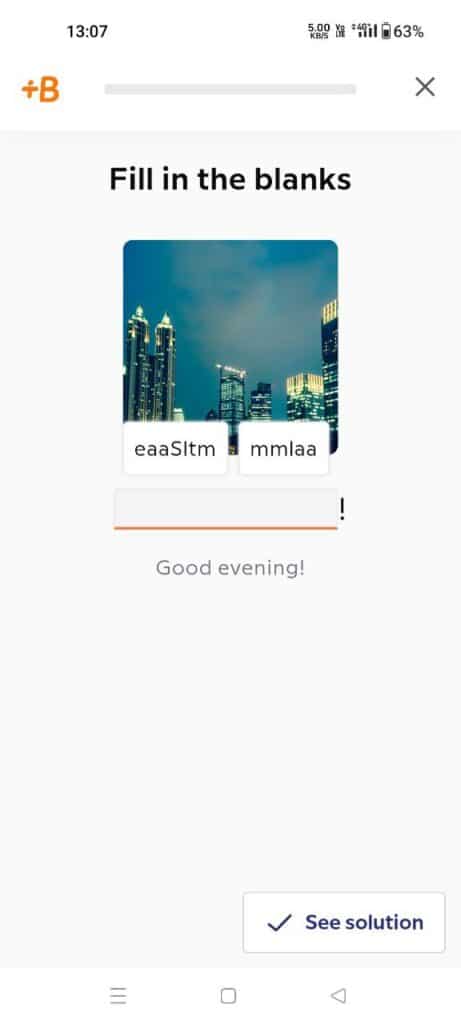
Both language learning apps make use of translations for better understanding, but to varying degrees. Babbel favors context-based learning to assist students in comprehending meanings without only relying on translations.
While providing translations, Mondly promotes collaborative participation that goes beyond simple language translations. Your preferred method of language learning will depend on whether you prefer a context-driven approach (Babbel) or are at ease with a combination of translations and interactive activities (Mondly).
Pricing
| Plans | Babbel | Mondly |
|---|---|---|
| 1 Month | $13.95 (1 language) | $9.99 (1 language) |
| 3 Months | $37.95 (1 language) | – |
| 6 Months | $62.70 (1 language) | – |
| 12 Months | $79.80 (1 language) | $47.99 (1 language) |
| Lifetime | $299 (14 languages) | $89.99 (41 languages) |
- Both platforms offer various pricing options tailored to different needs. Babbel’s lifetime package, which includes 14 languages, is affordable for people who are interested in learning numerous languages. On the other hand, Mondly’s lifetime option for 41 languages might appeal to polyglots and exploratory learners.
- Both applications include rich information and entertaining features that have the potential to dramatically improve language abilities. Babbel’s methodical approach could provide a solid foundation, whereas Mondly’s immersive learning environments might result in efficient learning.
- Users should anticipate a significant return on their investment in terms of language competency given the frequency of usage and the tools each platform provides.
- Affordability depends on individual preferences and budget constraints. Babbel’s lifetime option may be more affordable for individuals looking for all-encompassing language coverage even though Mondly’s price is often more affordable.
- Both Babbel and Mondly provide cost-effective methods to acquire language competency in a variety of languages when comparing the price to the benefit of language progress. You can always cancel Babbel subscription if you didn’t find worthy.
What is the difference between Babbel and Mondly?
Babbel stands out for its strong focus on practical language skills and real-world usage. The platform is a terrific option for students who prefer a methodical approach since it is excellent at presenting organized knowledge that advances logically. Aside from offering basic conversation lessons, It also provides more focused programs like Business, Travel, and Culture.
Mondly stands out because to its extensive language choices, making it a popular pick for polyglots or those eager to learn new languages. Its immersive elements, which go beyond vocabulary and grammar instruction, include VR lectures and cultural insights. Additionally, it’s chatbot capability allows for practice talks via dynamic simulations, which is a significant addition.
Each platform has its own advantages. Babbel’s realistic method and specialized classes are good for people who want to reach specific goals. On the other hand, Mondly’s interactive features and wide range of languages make for a fun learning trip for people who want to explore and talk to others.
Babbel is best for whom & how?
Babbel is most suitable for language learners who want a methodical and disciplined approach to learning a language. It is a great option if you want to establish a solid foundation in a particular language and put an emphasis on practical communication skills.
Its well planned curriculum, which is based on commonplace circumstances, guarantees that you learn vocabulary and grammar in context, making it simpler to use in practical settings.
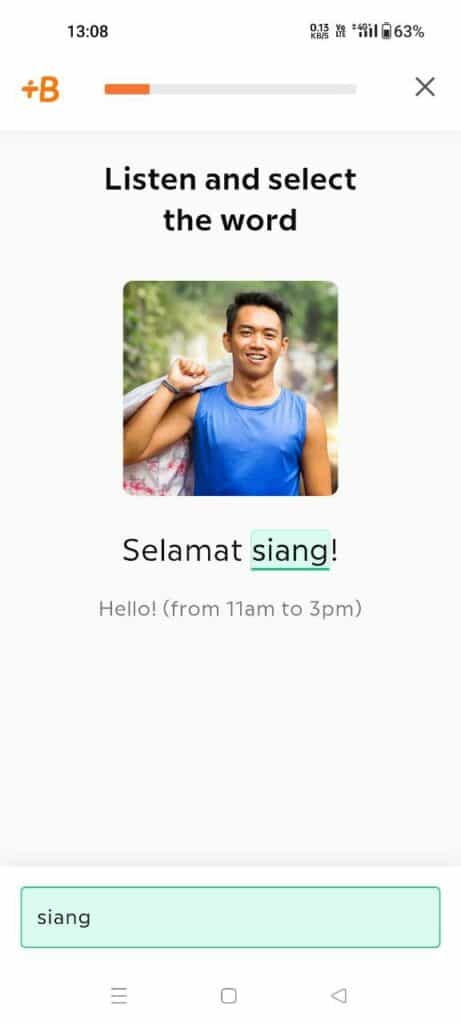
With interactive activities and quizzes, Babbel’s focus on speaking, writing, and pronunciation helps students gain confidence in their language abilities. The platform’s progress monitoring and review sessions ensure continual learning development and knowledge retention. Babbel is an excellent choice for anyone with specific language demands, such as those related to business or travel, thanks to its specialized courses.
It offers a thorough learning experience that can take you from a novice to conversational competency in your chosen language if you’re seeking for a systematic and effective way to acquire practical language skills.
See: Can you share your Babbel account?
Mondly is best for whom & how?
Mondly is best suited for students looking for an immersive and dynamic language learning experience, especially those who are curious about learning a variety of languages.
It is a great option if you prefer learning that is gamified with dynamic challenges and are attracted to technology-enhanced methods. Its innovative features like augmented reality (AR) and virtual reality (VR) lessons create a unique and engaging learning environment.
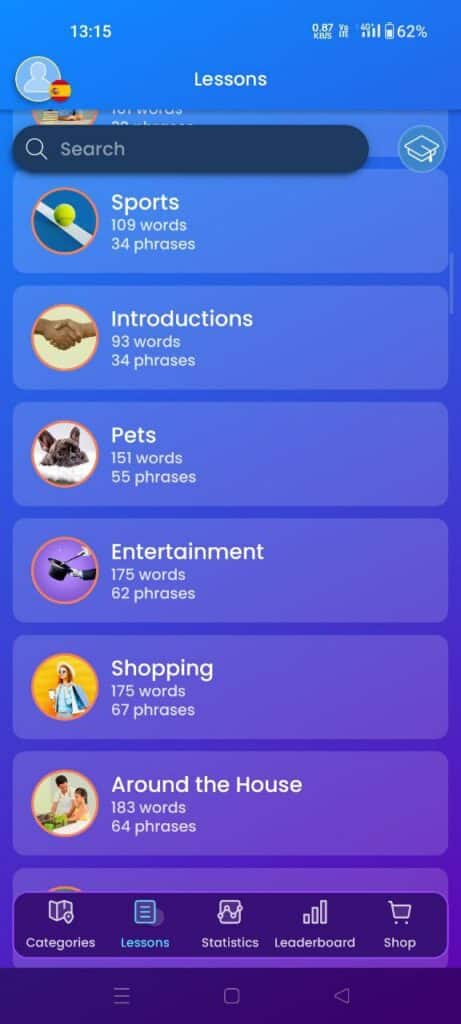
It is also ideal for anyone who wish to practice their speaking and pronounciation a lot. The voice recognition feature of the app gives you immediate feedback to help you improve your spoken language abilities. The platform’s broad language selection also appeals to language aficionados, tourists, and anybody interested in learning many languages.
Mondly’s daily lessons, interactive simulations, and diverse exercises encourage consistent engagement and variety in your learning journey. It provides an engaging and immersive platform that can make learning a language fun and rewarding if you’re looking for a more interactive and game-like approach to language learning and are open to discovering other languages.
Babbel user Feedbacks
Is Babbel good to learn a language? Despite a few small annoyances, the Babbel app is praised for being among the greatest language learning tools. The “complete the dialogue” parts frustrate one reviewer, who points out their length and the annoyance of having to retake the whole section because of a single error. The program is praised for its quality overall, although the aforementioned problem jumps out.
This language app stands apart in comparison to other language learning applications. Duolingo’s simplicity and Rocket Languages‘ monotony fall short compared to Babbel’s captivating and challenging nature. By explaining the “why” underlying linguistic idiosyncrasies, Babbel’s extensive review system and micro-grammar courses balance learning.
The app is lauded for its entertaining and user-friendly design. The user experience is improved by scheduling reminder alerts, recognizing typos without penalizing users, and putting a focus on native-like speech.
Some criticize the oral response system, pointing out its unreliable voice detection and limited diversity in pronunciation. There are certain cases when words that were spoken properly were incorrectly marked.
Babbel seems to be helpful for beginners, although those who have already learned a language have worries. It might be difficult for skilled learners to start at the proper level since there is no placement exam. For users who are already comfortable with the language, the locked future classes and suggested beginning lesson are frustrating.
Mondly user Feedbacks
The Mondly app is praised for its simple and efficient approach to language learning, which appeals to people who have looked at other language learning choices. The reviewer mentions that they have the premium edition and emphasizes how appealing the interface and user-friendly layout of Mondly are.
The novel language-learning strategy of the app is praised for making the process more pleasant than conventional classroom techniques. The integration of daily lessons is a unique feature, providing students with fresh information every day as well as the option to review earlier daily lessons, which is especially useful for premium customers.
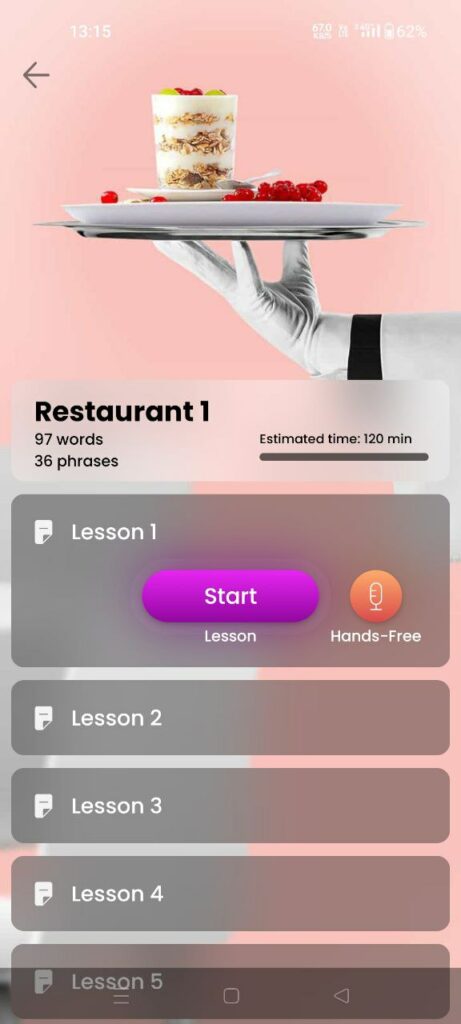
One user praises Mondly for enabling them to review their high school Spanish knowledge and acknowledges the app’s success in reinvigorating language abilities. The software is praised generally, however there is a need for additional speaking activities, especially contextualized dialogues. The user’s proposal attempts to improve the conversational component of the program, making language learning more engaging.
Another customer, who just began using the program, likes its method of repetition-based Japanese learning. The reviewer sees benefit in quickly becoming acquainted with terminology and identifying them. The app should have different custom talks to imitate more realistic discussions and increase language exposure.
Collectively, these assessments highlight Mondly’s intuitiveness, fun learning environment, and consistent instruction as key characteristics. They also note the app’s potential for conversational practice and personalization, while praising its language learning qualities.
Babbel vs Mondly- Summary
What did We like?
Unlock the world of language learning with Mondly. It provides a rich, interactive experience with a staggering 41 language choices and cutting-edge tools like augmented reality (AR) and virtual reality (VR). Its gamified aspects, daily challenges, and voice recognition technologies improve pronunciation and keep motivation high. Mondly’s dynamic method makes language learning entertaining and efficient, whether you’re a multilingual person seeking exploration or a novice searching for interesting courses.
- Extensive Language Selection
- Immersive Learning
- Speech Recognition Technology
- Daily Lessons and Challenges
- Interactive Conversations
- Varied Learning Exercises
- Gamified Elements
- Longer Lesson Length
- Focus on Basic Conversations
- Potential Learning Curve
Babbel
Total Languages: 14
Starts from: $37.95
20 Days Money Back Guarantee
What did We like?
🌍Babbel provides a methodical approach to language learning, complete with carefully selected material, real-world examples, and individualized review sessions. It is excellent that it places such high emphasis on pronunciation and everyday discussions. However, if you’re looking for an extensive language selection or a more gamified experience, Babbel might fall short. Users looking for more extensive language exploration or a highly participatory learning experience might not find the restricted language options and rather little gamification components to their liking.
- Structured Learning
- Real-world Context
- Variety of Languages
- Focused Pronunciation Practice
- User-friendly Interface
- Personalized Review Sessions
- Specialized Courses
- Limited Language Selection
- Less Gamification
- Lacks Advanced Content
Mondly takes the lead with an extensive selection of 41 languages, providing a wider range for learners interested in exploring diverse linguistic horizons.
Yes, both Babbel and Mondly offer tools for practicing speaking and pronunciation. Babbel focuses on real-world dialogues, while Mondly employs speech recognition technology for interactive conversation practice.
While both apps incorporate gamified elements, Mondly places a stronger emphasis on gamification with daily challenges, streaks, and rewards, creating a more playful and engaging learning environment.
Both apps cater to beginners and intermediate learners. Babbel’s structured approach is great for building a strong foundation, while Mondly’s immersive features cater to various proficiency levels.
Yes, both apps offer offline learning options. You can download lessons and content in advance, enabling you to practice even without an active internet connection, making learning convenient while on the go.
Both Babbel and Mondly have their strengths. Babbel offers practical proficiency with structured lessons, while Mondly emphasizes immersion and gamification. The better choice depends on your learning preferences and goals.
Babbel aims to help learners achieve practical proficiency, but fluency depends on various factors like practice, dedication, and exposure. Consistent use of Babbel can significantly enhance your language skills, but reaching fluency requires continued effort.
Babbel allows you to learn at your own pace. The number of lessons per day depends on your schedule and learning capacity. Starting with one or two lessons a day and gradually increasing can be effective, but finding a pace that suits you is key.
While Babbel is effective for practical language skills, some learners might find its language selection limited compared to other platforms. Additionally, its gamification elements are less prominent, which might be a drawback for those seeking a more playful approach.
Babbel offers a free trial period, but access to its full content requires a subscription. The subscription provides comprehensive access to lessons, exercises, and features, making it a valuable investment for serious language learners.
Mondly pricing starts for as low as $9.99 for a month with lifetime cost of $90 for 41 languages.

Meet Bill, a French language teacher and blogger who specializes in testing various language learning apps. He has been teaching French for nearly 4 decades and holds a Bachelor’s degree from Manhattanville College. With a passion for technology and how it can enhance language learning, Bill has spent years testing and reviewing different language learning platforms. His blog provides valuable insights into the pros and cons of each app, as well as tips for language learners of all levels.
